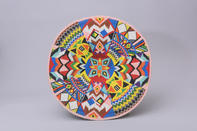In KwaZulu-Natal, basket traditions historically associated with men were gradually taken over by women in the course of the twentieth century.

Hastened by the departure of men in search of work on the mines and in large cities such as Durban and Johannesburg, female involvement in the basket industry received renewed impetus in the late 1980s following the breakdown of the apartheid state’s influx control regulations. Rural women flocking to the cities to join their husbands sought new forms of employment.
Those living in the Siyanda informal settlement on the outskirts of Durban became noted for the production of large coiled platters made from multicoloured plastic telephone wire, among them, Ntombifuthi Magwaza, who won a highly respected national craft award in 1998.
The use of colour and pattern in many of the wirework platters produced by these women is demonstrably influenced by the design principles underlying local beadwork traditions.
Magwaza, who was born in 1965, was raised by her grandmother, a skilled beadworker. Interestingly, Magwaza’s working method is spontaneous and largely intuitive. Her designs are never planned in advance, but emerge organically through the juxtaposition of different colours.
 When the artist-explorer George Angas published his folio volume on his visit to southern Africa most of the hand-tinted plates of Zulu subj...
When the artist-explorer George Angas published his folio volume on his visit to southern Africa most of the hand-tinted plates of Zulu subj... While some rural women flocked to the cities to join their husbands, sometimes finding work in cottage industries serving South Africa’s b...
While some rural women flocked to the cities to join their husbands, sometimes finding work in cottage industries serving South Africa’s b... In areas such as present-day KwaZulu-Natal, basket coiling traditions were originally associated with men. In other communities, some winnow...
In areas such as present-day KwaZulu-Natal, basket coiling traditions were originally associated with men. In other communities, some winnow... Closely-coiled grass and reed baskets are commonly made for a variety of purposes such as the storing of grain and other foodstuffs in the h...
Closely-coiled grass and reed baskets are commonly made for a variety of purposes such as the storing of grain and other foodstuffs in the h... The range of colours available to producers making artefacts from plastic coated telephone wire was initially extremely limited....
The range of colours available to producers making artefacts from plastic coated telephone wire was initially extremely limited....